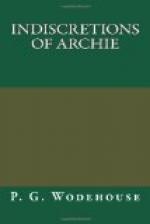“This,” he said, with a shake in his voice, “is something very special. China figure, said to date back to the Ming Dynasty. Unique. Nothing like it on either side of the Atlantic. If I were selling this at Christie’s in London, where people,” he said, nastily, “have an educated appreciation of the beautiful, the rare, and the exquisite, I should start the bidding at a thousand dollars. This afternoon’s experience has taught me that that might possibly be too high.” His pince-nez sparkled militantly, as he gazed upon the stolid throng. “Will anyone offer me a dollar for this unique figure?”
“Leap at it, old top,” said Reggie van Tuyl. “Twiddle, dear boy, twiddle! A dollar’s reasonable.”
Archie twiddled.
“One dollar I am offered,” said the high-priest, bitterly. “One gentleman here is not afraid to take a chance. One gentleman here knows a good thing when he sees one.” He abandoned the gently sarcastic manner for one of crisp and direct reproach. “Come, come, gentlemen, we are not here to waste time. Will anyone offer me one hundred dollars for this superb piece of—” He broke off, and seemed for a moment almost unnerved. He stared at someone in one of the seats in front of Archie. “Thank you,” he said, with a sort of gulp. “One hundred dollars I am offered! One hundred—one hundred—one hundred—”
Archie was startled. This sudden, tremendous jump, this wholly unforeseen boom in Pongos, if one might so describe it, was more than a little disturbing. He could not see who his rival was, but it was evident that at least one among those present did not intend to allow Pongo’s brother to slip by without a fight. He looked helplessly at Reggie for counsel, but Reggie had now definitely given up the struggle. Exhausted nature had done its utmost, and now he was leaning back with closed eyes, breathing softly through his nose. Thrown on his own resources, Archie could think of no better course than to twiddle his fingers again. He did so, and the high-priest’s chant took on a note of positive exuberance.
“Two hundred I am offered. Much better! Turn the pedestal round, Willie, and let them look at it. Slowly! Slowly! You aren’t spinning a roulette-wheel. Two hundred. Two-two-two-two-two.” He became suddenly lyrical. “Two-two-two—There was a young lady named Lou, who was catching a train at two-two. Said the porter, ’Don’t worry or hurry or scurry. It’s a minute or two to two-two!’ Two-two-two-two-two!”
Archie’s concern increased. He seemed to be twiddling at this voluble man across seas of misunderstanding. Nothing is harder to interpret to a nicety than a twiddle, and Archie’s idea of the language of twiddles and the high-priest’s idea did not coincide by a mile. The high-priest appeared to consider that, when Archie twiddled, it was his intention to bid in hundreds, whereas in fact Archie had meant to signify that he raised the previous bid by just one dollar. Archie felt that, if given time, he could make this clear to the high-priest, but the latter gave him no time. He had got his audience, so to speak, on the run, and he proposed to hustle them before they could rally.




